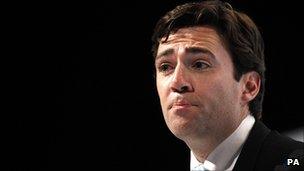School leavers 'left to fend for themselves'
- Published

Mr Burnham said more needed to be done to help young people who go straight into work
Labour should have done more for the 50% of youngsters who do not plan to go to university, Shadow Education Secretary Andy Burnham says.
He told Labour's annual conference that schools had been seen "solely as preparation for university" for too long.
Those who go straight into work or apprenticeships were left to fend for themselves, he said.
He also claimed ministers were diverting funds from the most needy.
Speaking at his party's conference in Liverpool on Wednesday, he said: "Let's be honest about the 50% of kids who don't plan to go to university. We needed to do more in government about these young people.
"For too long the debate about schools in this country has been solely as preparation for the university route.
"Young people on the university route know what is expected if they are to make the grade.
"There is a national application system system bringing all degree courses under one roof - the Ucas system."
'Damaging message'
This is the admissions system run by the university and college admissions services which offers advice and guidance to applicants.
But he warned: "Young people who want to head towards work and apprenticeships are left to fend for themselves."
And he called for a "Ucas-style" system for apprenticeships. This would mean those seeking apprenticeships being able to see what is available and how to apply for them and what is required to do so, he said.
But Mr Burnham also warned that the government was sending a "damaging message" to schools with its English Baccalaureate.
This is a new measurement of how many candidates in a school achieve good GCSE grades in English, maths, two sciences, a language and either history or geography.
He said these subjects were "not right for everyone" and accused the government of "saying that only the subjects in the English Baccalaureate are the ones worth taking".
"In the 21st Century, why is Latin and Ancient Greek in, but engineering, ICT and business studies out?
"What right have ministers got to choose an arbitrary list of subjects and say that anyone who doesn't choose them is somehow second best?"
This view is reflected by head teachers' organisations the Association of School and College Leaders.
The union's general secretary Brian Lightman has said ministers ought to be cautious about the message they send to young people who are not taking these subjects but who have worked hard.
Instead, Mr Burnham wants to see a "Modern Baccalaureate" as an alternative to what he describes as "Gove's narrow backward-looking vision".
'Stuck in the past'
He accused Education Secretary Michael Gove of having "elitist and divisive" policies and said he was "stuck in the past".
He criticised Mr Gove for scrapping the Building Schools for the Future programme, which rebuilt schools in need of refurbishment, and accused him of favouring free schools and academies over others schools.
"Mr Gove's academies are not Labour's academies," he said.
Under the Labour government, academies were set up as a way of raising attainment in under performing schools in challenging areas.
But under the coalition, academy status has been granted to schools judged to be outstanding by inspectors.
Chris Keates, general secretary of the NASUWT teachers' union, said Mr Burnham's speech would "resonate with a lot of people".
She said: "The idea of the Ucas-style system of apprenticeships sends a clear and welcome message about the central importance of securing parity of esteem between academic and vocational pathways.
"This will need to be matched by a national framework of entitlement for learners and supported by a national framework of pay and conditions of service to raise the status of the professionals who deliver vocational courses.
"Having correctly identified the scale of the coalition's attack on state schools, Labour must act now to ensure that by the time of the next election there is still a state education system."
- Published25 September 2011